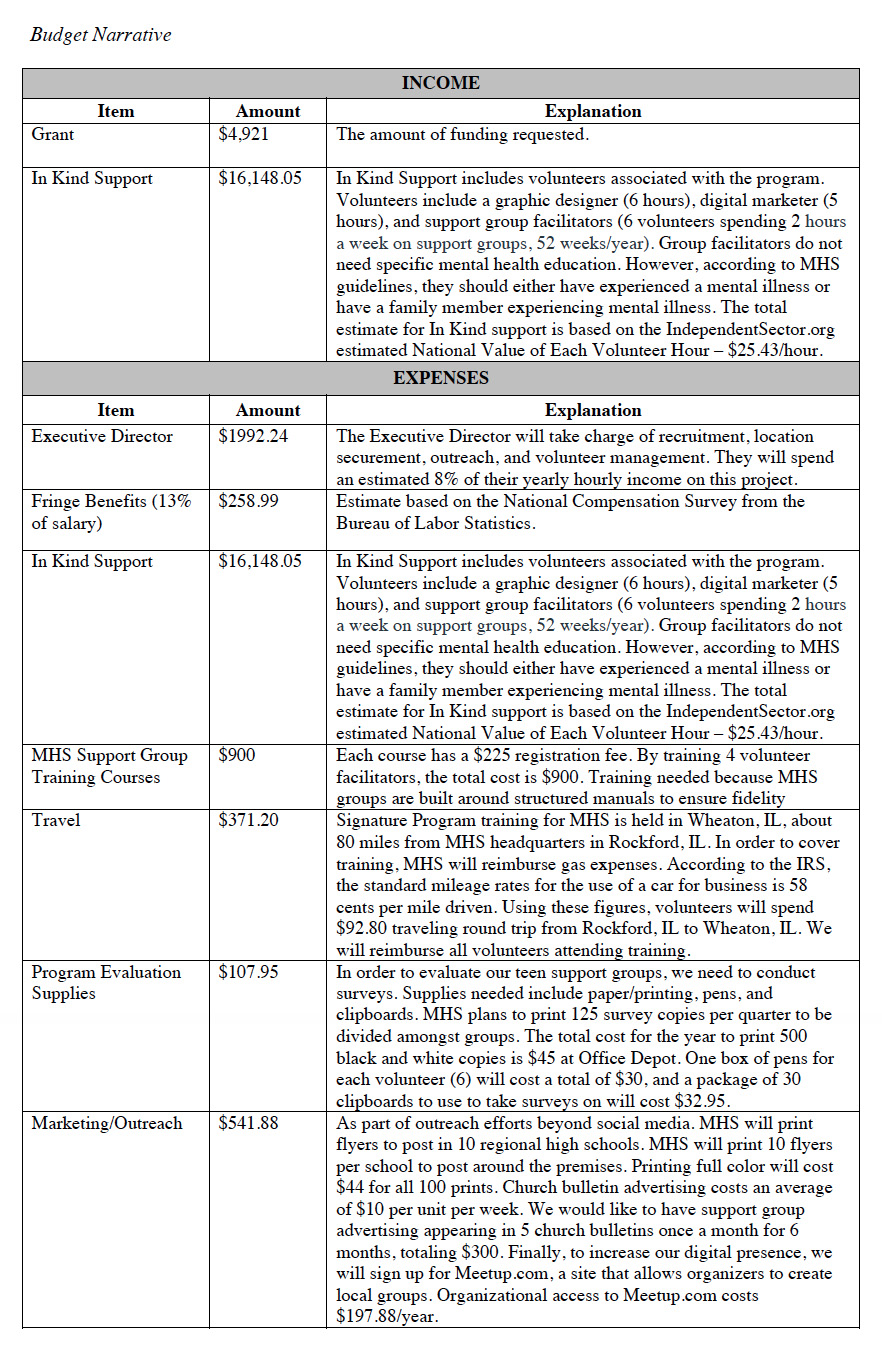Teen Support Group Expansion and Training
From: Mental Health Support
To: Community Foundation
Funding Request: $4,921
Introduction
Over 40 million people in the US experience mental illness each year and suicide is the 2nd leading cause of death among people aged 10-34, according to the National Alliance on Mental Illness (NAMI). Stigma and lack of outreach make it difficult for those struggling to find appropriate treatment. Access to regular support groups could help remove some of these barriers, offering a place for adolescents to find resources and speak openly about their struggles.
Recently, Mental Health Support (MHS), a Northern Illinois based mental health support organization, acquired a small support group service program entitled Hope Now. Hope Now offers facilitator-lead support groups for adults weekly, as well as teen support groups every other week, in Winnebago County. MHS would like to expand their teen support group offerings to twice weekly and increase the reach of these programs to additional counties served by MHS.
Program Need
There is considerable need for adolescent mental health services in Northern Illinois’ Winnebago, Boone, and Stephenson counties, starting with increased access to support groups.
Studies provide evidence that participation in support groups has direct and indirect benefits on quality of life and symptom reduction and is effective in enhancing social networks that improve support. (Insert study evidence here.) Furthermore, increased communication about mental health can help fight stigma surrounding mental illness and help attendees find further support and resources.
In 2016, the Winnebago County Mental Health Advisory Committee found that mental health stigma still is a major issue in the region and wait lists for pediatric/adolescent mental health services are exceptionally long.
Furthermore, according to NAMI, 1 in 6 U.S. youth aged 6-17 experiences a mental health disorder each year. The population base for the counties MHS serves is 383,345 (according to the 2010 US Census). By applying these statistics, it can be assumed that approximately 63,890 adolescents in the region experience mental illness in any given year. Increasing Hope Now/MHS support group services by adding locations and timeslots will better serve the magnitude of the need in the region and further MHS mission priorities – education and support.
About the Organization
MHS is an Illinois-based mental health support organization serving Winnebago, Boone and Stephenson counties. Members are families, friends, professionals, advocates, and people living with mental illness. Our goal is provide education, offer support and resources, and advocate for those who need assistance.
Program Overview
Goal
Adolescents in Northern Illinois who are experiencing mental health problems will have access to the support they need to continue their development, build better lives, and reach wellness.
Objectives
Implement two weekly teen support groups, available year-round, in Winnebago, Boone, and Stephenson counties by the end of 2020.
70% of surveyed group attendees who regularly participated over a three month period will feel more understood and less stigmatized, helping to bridge-the-gap between therapy and community.
Strategies/Methods
- Group facilitators will administer voluntary, anonymous, baseline surveys with teen group attendees to evaluate current group effectiveness – December 2019.
- Executive Director and Board will recruit 4 group facilitator volunteers for Stephenson, Winnebago, and Boone counties (two per county – Winnebago and Boone previously have one facilitator each) – November 2019 – February 2020.
- Executive Director will research group locations for Stephenson County. They will also contact the current support group locations in Winnebago and Boone counties to inquire about increased availability. If unavailable, alternative locations will be researched – February 2020 – April 2020.
- MHS will train four new group facilitators – March 2020 – April 2020.
- Executive Director will reach out to local high schools to advertise teen groups. Schools include Auburn, East, Jefferson, Belvidere, and Freeport. They will also contact churches to place advertisements in weekly bulletins. Churches include St. Peters, St. James, Our Savior’s Lutheran, City First, and Heartland Community Church – May 2020.
- Graphic Design volunteer will create marketing materials – May 2020.
- Executive Director and Digital Marketing volunteer will distribute marketing materials to schools and churches, announce new groups on social media and websites, update online calendars, and email the MHS listserv to spread the word about new support group availability – July 2020.
- Groups officially launch. Facilitators will continue to survey attendees quarterly – August 2020.
Budget
MHS is requesting a total of $4,921 to cover training and implementation of this program.
Expenses are as followed:


Program Sustainability
MHS plans to continue providing ten support group services for adolescents going forward. Once implemented, the program will be self-sustainable, much like our other support groups, as ongoing costs are very low. By having volunteers trained as group facilitators and donated host locations, future costs of the program will only include additional trainings, continued marketing efforts, and replenished survey supplies. Covering these expenses will be included as goals within our yearly fundraising events, which have been very successful in the past, accounting for 48% of our total income in 2018.
Evaluation
Evaluation of teen support groups will help MHS ensure positive group development. Our program begins with surveying current attendees to determine group effectiveness and member status. All surveys will be voluntary and anonymous. After the expanded program is established, group facilitators will administer surveys on a quarterly basis in order to maintain quality and ascertain if changes are necessary. Group facilitators will meet to analyze the surveys, reporting any necessary changes back to the MHS executive director. For those participants who have regularly attended groups for three months or more, our goal is to have 70% of those attendees report that they feel better understood and less stigmatized in the local community.
UIC Certificate in Nonprofit Management – Step by Step: How to Write a Winning Grant Proposal
Assignment Description: Create a four page document grant proposal, including goals, objectives, and budget details.
- Note: Some statistics/data not included as per project requirements
*For educational purposes only. Proposal not submitted. Organization and foundation named changed for anonymity.

